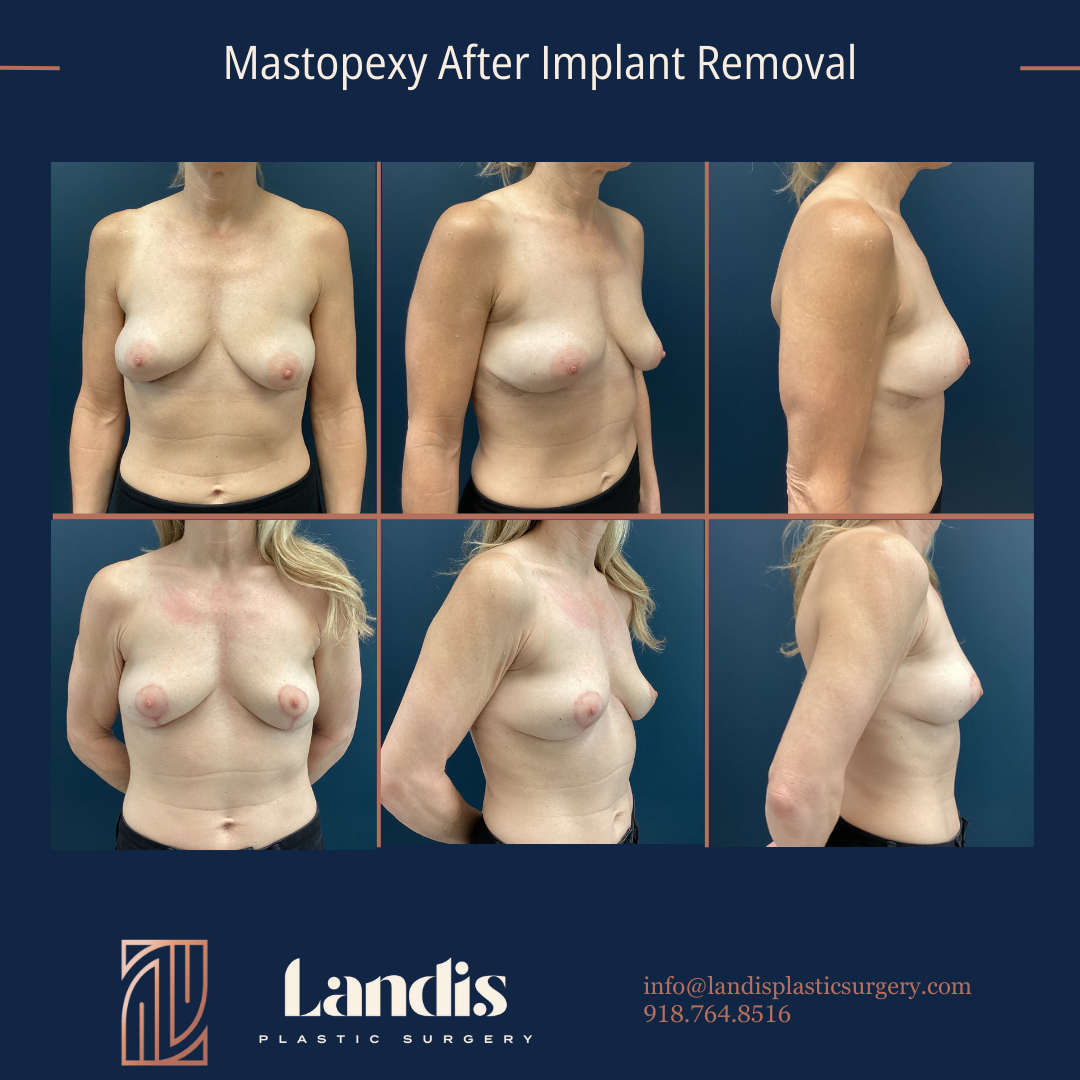Other Procedures
Other Procedures
Upper Blepharoplasty
Otoplasty
Lower Blepharoplasty
Lip Lift
Face Lift
SkinPen
Neck Lift
Injectables
Breast Augmentation
Breast Re-Augmentation
Breast Lift
Breast Augmentation + Lift
Breast Re-Augmentation + Lift
Breast Reduction
Breast Implant Removal
Breast Implant Removal + Lift
Breast Reconstruction Revision
Revision Breast Surgery
Breast Fat Grafting
Nipple Procedures
Mommy Makeover
Liposuction
Thigh Lift
Arm Lift
Abdominoplasty
Fleur-de-lis Abdominoplasty
Labiaplasty
Body Contouring
Scar Revision
Skin Lesion Removal
Breast implant removal, also known as explantation, is a surgical procedure that involves the removal of breast implants. This procedure can be performed for various reasons, including personal preference, implant-related complications, or changes in personal health or aesthetic goals. Often women choose to undergo a breast lift to improve their final breast shape after breast implant removal. Not all women are good candidates to undergo breast lift at the time of implant removal. Some women will need to have these surgeries staged, with a breast lift occurring three months later. This gives the breast tissue and skin time to contract and heal. Dr. Landis will discuss the option best-suited for the patient to ensure a safe, reliable result.
Reasons for Breast Implant Removal:
- Personal Preference: Some individuals may choose to have their breast implants removed because they no longer desire the enhanced breast size or shape that the implants provide. Personal preferences and aesthetic goals can change over time, and breast implant removal allows individuals to return to their natural breast appearance. Trends in aesthetic appearance also change with time, which can lead a woman to decide to increase or decrease her breast size.
- Implant-Related Complications: Breast implants may occasionally develop complications that require removal. These complications can include implant rupture, capsular contracture (excessive scar tissue formation around the implant), implant malposition, or implant-associated infection. In such cases, removing the implants can help alleviate symptoms and improve overall breast health. Often women will decide to have the implants replaced with new implants at the time of surgery.
- Health Concerns: In certain situations, individuals may opt for breast implant removal due to concerns about their overall health. This may include concerns about the long-term effects of breast implants, autoimmune reactions, or “breast implant illness” (a collection of symptoms some individuals attribute to their breast implants). It is important to note that “breast implant illness” is not an official medical diagnosis, and these issues are continuing to be studied. Dr. Landis can never promise that systemic or non-breast illnesses will be cured with breast implant removal, but during a consultation she will discuss realistic outcomes for a patient’s decisions.
Reasons for Breast Lift After Breast Implant Removal:
- Sagging breasts: Over time, breasts may lose their natural shape and firmness due to pregnancy, breastfeeding, weight fluctuations, aging, or genetic predisposition. It is very common after breast implant removal to have a more ptotic, or sagging, breast appearance. A breast lift can address these issues and restore a more youthful position and contour.
- Inadequate breast volume: Some individuals may have naturally small or deflated breasts, which can contribute to a sagging appearance. After breast implant removal a patient will have smaller breast volume. A breast lift can be performed to achieve a more desirable shape. Fat grafting can also be used to restore fullness.
- Nipple and areola position: In addition to lifting the breasts, a breast lift surgery repositions the nipples and areolas to a more aesthetically pleasing location on the breast mound. This can help create a more balanced and proportionate appearance after breast implant removal. The areola is also often made smaller in women with large areola.
Procedure:
Breast implant removal with mastopexy (breast lift) is performed under general anesthesia and takes approximately 2 hours, depending on the complexity of the case. Dr. Landis will make incisions to access the underlying breast tissue and remove the breast implants along with any surrounding scar tissue (capsule) that can be safely removed. The technique used will depend on the specific case. In some cases, a total capsulectomy (complete removal of the scar tissue capsule) may be necessary, and in others only a partial capsulectomy can be performed.
There are different types of incisions that can be used during breast implant removal mastopexy, including:
- Anchor incision (inverted T): This is the most common incision technique, involving an incision around the areola, vertically down the breast, and horizontally along the breast crease. It allows for significant reshaping, lifting, and placement of the implants.
- Lollipop incision (vertical): This technique involves an incision around the areola and vertically down the breast but does not have the horizontal incision along the breast crease. It is suitable for individuals with moderate breast sagging and can accommodate the placement of implants.
- Donut incision (periareolar): This technique involves a circular incision around the areola. It is suitable for individuals with mild breast sagging and minimal excess skin.
Dr. Landis will then lift and reshape the breast tissue, reposition the nipples and areolas, and remove any excess skin. The incisions are closed with dissolvable suture, surgical tape dressings applied, and the patient is placed in a post-operative bra.
Recovery and Aftercare:
After breast implant removal mastopexy surgery, patients may experience temporary soreness, swelling, and bruising. A supportive bra is provided on the day of surgery and is worn continuously for the first week to minimize swelling and provide support during the healing process. It is essential to follow Dr. Landis’ post-operative instructions regarding medication, wound care, and physical activity restrictions.
Breast implant removal mastopexy patients are instructed to rest at home for one week, refraining from driving or lifting anything greater than 5 lbs. Patients may shower 2 days after surgery, but may not submerge in a bath tub or pool for 6 weeks. After one week a patient may return to normal daily activities and a desk job. Patients with a more physically demanding job may require more time off work. All patients are cleared at 3 weeks to slowly resume exercise activities.
It is important to have realistic expectations as to size and shape of breasts after explantation and breast lift. Dr. Landis will speak with you about your likely appearance after surgery.
Potential Risks and Complications:
Like any surgical procedure, breast implant removal with breast lift carries potential risks and complications. These may include:
- Infection
- Bleeding
- Poor wound healing
- Changes in breast sensation
- Changes in breast shape or size
- Scarring
- Fluid collection (seroma)
- Asymmetry
Dr. Landis will address any concerns or questions you may have before deciding to undergo breast implant removal mastopexy.
Cost:
Breast implant removal mastopexy cost includes the surgeon fee, facility fee, anesthesia fee, and any labs or imaging that may be required before or after surgery. The total cost for a breast implant removal mastopexy ranges from $10,500 – $12,000 and varies if any additional surgery is required. Dr. Landis will formulate a plan specific for each patient and a detailed estimate will be provided. CareCredit is available to our patients, and we’d be happy to discuss this option with you!
Conclusion:
Breast implant removal with breast lift is a surgical procedure that involves the removal of breast implants and rearranging of breast tissue for a better aesthetic appearance. It can be performed for various reasons, including personal preference, implant-related complications, or changes in personal health or aesthetic goals. If you are considering breast implant removal with breast lift, it is important to consult with a qualified, board-certified plastic surgeon like Dr. Landis who can evaluate your individual needs and goals, discuss the potential risks and benefits, and create a personalized treatment plan to achieve the desired results. Many patients elect to have their implants replaced or breasts lifted at the time of breast implant removal. Given the many options available for patients, Dr. Landis will take the time to walk patients through every appropriate option.

